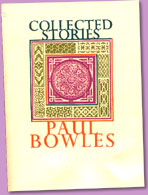
Title: Collected Stories, 1939-1976
Author: Paul Bowles
Year 1978
Publisher: Black Sparrow Press
Price: $25 US hardcover, $15 US paperback
Review by: Emma Taylor
|



Title: Collected Stories, 1939-1976
|

 |
Paul Bowles was a composer before he was a writer. Gertrude Stein told him he was "not a real poet," and for years Bowles left the writing to his wife, feminist Jane Bowles. Gore Vidal claims Bowles' short stories are "among the best written by an American," but that he remains unknown because he commited the cardinal sin and abandoned America, both physically and in his writing. (Although you might know Bowles from the 1990 Bertolucci film "The Sheltering Sky" with John Malkovich -- it was based on Bowles' novel of the same name.)Bowles grew up in New York, moved to France, lived in Mexico and finally settled in Tangier, Morocco, where he still lives. His stories waver between an education in folklore and folklore itself, but like travel writers of old, Bowles has the privilege of blurring this line mysteriously: most of us never have (and never will) venture to the world he describes. And if we did, we'd probably be one of the painful Americans who wander in and out of Bowles' stories, bumping into folklore and tripping over myths without ever knowing it. Ideally, Bowles' stories would be listened to and not read, so the reader could drift as the stories do, from waking to dreaming, from real life to myth. (Bowles is also a great believer in "kif-inspired" literature, but he makes no such demand of his reader.) Lie back and let Bowles take you across North Africa, through deserts and caves; where old ladies swallow scorpions, dogs carry demons, and six words can cause a man to slip into fissures of time.
"The Haddaoua placed great stress on food. Each meal was a banquet. This emphasis on eating may have been the result of the vast quantities of cannabis the men ingested each day, but the meals themselves were made possible by the easy availability of edible livestock. A Haddaoui could go out alone into the countryside and return in a few days with hundreds of goats following him in single-file formation. This alone was enough to strike fear to the hearts of the peasants. No one appears to know exactly how they imposed their will on the animals, but all agree that it was a special art which took time and patience to learn. When you consider that the men learned the technique by lying down among the animals and conversing with them at night during their sleep, it does not seem so improbable. The Haddaoui lying in the Marrakech dust forty years ago "became" a goat while I watched, and there in front of me was a man's body with a goat inside it, as if the goat had been able to assume the visible form of a man, while at the same time it remained unmistakably a goat. Whatever it was that they stumbled upon in the way of esoteric knowledge, their misuse of it was their undoing."
(From "Things Gone and Things Still Here," pp. 406-407)
Bowles' writing about Morocco drew such esteemed house guests as William Burroughs, Allen Ginsberg and Jack Kerouac. Bowles settled in Tangier because he thought it to be the magic place that would deliver him from all evil and writer's block (much as Sartre believed that a physical place could hold such magic). Bowles' esteem of local ("local" being Mexican or North African to Bowles) tradition, myth and religion is clear in his writing, yet the stories frequently veer toward the sinister. The stories will make you cringe (Americans frequent make asses of themselves in unfamiliar cultures); the stories will repulse you (in "The Delicate Prey" a young man's penis is cut off and inserted in his stomach); they will make you laugh (in "Things Gone" women wash dishes with cold water for fear of burning spirits in the drain); but most of all they will make you curious about places and people that may no longer exist -- if they ever did.
You can order this book from amazon.com (amazon.com only offers the hardcover version).
Have you read this book? How many wrenches would you give it? (The more wrenches, the better a Tool for Thought it is.)
Tripod members give this book 3.5 wrenches so far.
Read and rate more Tools for Thought.
Map | Search | Help | Send Us Comments